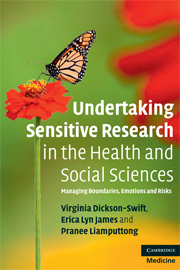 Undertaking Sensitive Research in the Health and Social Sciences
Undertaking Sensitive Research in the Health and Social Sciences Published online by Cambridge University Press: 11 September 2009
Efforts to address these issues would be enhanced by more published accounts of investigators' experiences in dealing with the effects on researchers of conducting studies on sensitive and emotionally laden topics: too little attention is given to documenting the process of carrying out research.
(Milling-Kinard, 1996:69)In this introductory chapter we examine a range of different definitions of sensitive research. We discuss the historical developments of sensitive research and explore some of the sensitivities inherent in undertaking qualitative research on such topics. We outline the importance of researching sensitive topics and provide an overview of the remainder of the book.
Defining sensitive research
There are many definitions of sensitive research, ranging from those that refer to the topic of investigation to those that encompass the whole of the research activity, including its implications for practice and the wider research community. Joan Sieber and Liz Stanley (1988:49) define ‘socially sensitive’ research as, ‘studies in which there are potential consequences or implications, either directly for the participants in the research or for the class of individuals represented by the research’. This definition of sensitive research is very general and by applying it, almost all social research could be defined as sensitive. All research has consequences of some kind. However, some consequences may be more directly harmful than others. Often discussions of what constitutes sensitive research focus too narrowly on only the ethical dimensions of sensitive research.
To save this book to your Kindle, first ensure no-reply@cambridge.org is added to your Approved Personal Document E-mail List under your Personal Document Settings on the Manage Your Content and Devices page of your Amazon account. Then enter the ‘name’ part of your Kindle email address below. Find out more about saving to your Kindle.
Note you can select to save to either the @free.kindle.com or @kindle.com variations. ‘@free.kindle.com’ emails are free but can only be saved to your device when it is connected to wi-fi. ‘@kindle.com’ emails can be delivered even when you are not connected to wi-fi, but note that service fees apply.
Find out more about the Kindle Personal Document Service.
To save content items to your account, please confirm that you agree to abide by our usage policies. If this is the first time you use this feature, you will be asked to authorise Cambridge Core to connect with your account. Find out more about saving content to Dropbox.
To save content items to your account, please confirm that you agree to abide by our usage policies. If this is the first time you use this feature, you will be asked to authorise Cambridge Core to connect with your account. Find out more about saving content to Google Drive.